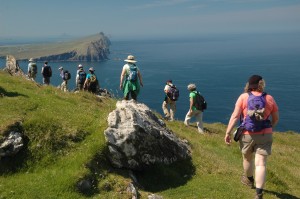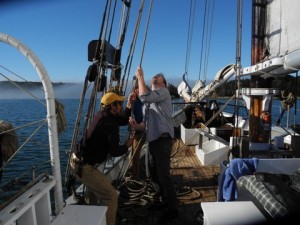Clark Norton
New Mexico’s Spaceport America, where Virgin Galactic hopes to launch the first commercial space flights. Photo from Virgin Galactic.
Fortune has come out with an interesting follow-up story to our previous post about Sir Richard Branson’s out-of-this-world venture Virgin Galactic, which aims to bring space tourism to America.
Some 600 affluent travelers — including plenty of intrepid baby boomers — have plunked down up to $250,000 each to be among the first passengers on a commercial flight into space, which could happen as early as 2014, though previous target dates have come and gone. With six passengers scheduled for each flight, that would already amount to 100 sold-out flights.
According to Fortune, one travel agency — Virtuoso — has landed exclusive rights to book passengers throughout the Americas onto the flights.
Virtuoso — which bills itself as “the travel industry’s leading luxury network” — includes more than 330 agencies… Continue reading

Omaha’s downtown skyline along the riverfront, looking good. Photo from VisitOmaha.com.
Viewers watching the recent NFL playoff game between the Denver Broncos and San Diego Chargers could hardly have missed Broncos’ quarterback Peyton Manning shouting “Omaha, Omaha!” repeatedly while calling signals. Someone counted up all the “Omahas” and came up with a total of 44 out of 70 snaps.
According to ESPN analysts, calling “Omaha” as a signal — either to alert teammates to an impending hike or changed play or possibly to draw the defense offsides, as Manning did twice — actually started years ago with quarterback Tom Brady of the New England Patriots. But with Manning wired up by CBS during the Broncos’ telecast, “Omaha!” has now become a minor football phenomenon. #OmahaOmaha even trended on twitter during the game, and @VisitOmaha, the twitter handle of the Omaha Convention and Visitors Bureau (OCVB), tweeted: “We certainly appreciate all… Continue reading
Miley Cyrus putting “twerking” into the news.
The answer to the above heading is “probably not.”
But it may have caught your attention. And that’s the point.
Celebrities — celebrity news, celebrity endorsements, celebrity appearances — can help drive traffic to businesses, including travel businesses.
And while Miley Cyrus and her “twerking” routine — which Yahoo reported was one of the top-searched items of 2013 — may not be a baby boomer obsession, other, shall we say more mature, celebrities can be very helpful indeed.
In the theme cruise column I write for Porthole Cruise Magazine, some of the most successful cruises I’ve featured use appearances by old-time baseball stars, soap opera stars, Broadway music stars — even political pundits who often show up on TV — to attract passengers. The passengers get to mix and mingle with the celebrities, the cruise lines get to fill cabins, and… Continue reading

Besides these standard amenities, Loews Vanderbilt Hotel might have a birthday cake waiting in your room when you arrive.
A few months ago on this blog I posed the question, “Is ‘Personalization’ the Next Big Trend in Hotels?”
The blog post laid out the vision of Starwood Hotels CEO Frits van Passchen that emerging technology would soon allow hotels to know in advance what their guests are looking for and like — much as Amazon.com, Facebook, and, as I recently wrote about, Pandora, the internet music service, know about their customers through mining their vast data banks.
It turns out that several luxury hotels are already using social media to do just that.
According to the Toronto Globe and Mail, hotels in the Loews chain are checking out the Facebook pages of future arrivals to add those little personal touches to their rooms that will be memorable enough… Continue reading

Philadelphia’s Old City neighborhood beckons tourists from around the world. Photo by J Fusco for Visit Philadelphia.
What do you do if you’re in charge of marketing a city destination and you lose most of your state funding?
If you’re Meryl Levitz, president and CEO of Visit Philadelphia — the official destination marketing organization for the city and five regional counties — you get creative.
Levitz, who has headed up Visit Philadelphia (known as the Greater Philadelphia Tourism Marketing Corporation until November 2013) since the mid-1990s, told the travel site Skift.com that her biggest challenge was funding, with Pennsylvania state cutbacks resulting in a one-third cutback in her budgets for the past three years. State funding for Visit Philadelphia has dropped from $4 or $5 million a year to zero, though this year they’re getting a special $850,000 grant from the state to promote countryside towns in the area.… Continue reading
The Freewheelin’ Bob Dylan album — what does it say about my travel preferences?
If — as a Woodstock generation baby boomer in good standing — I choose to listen to Bob Dylan, The Band, the Rolling Stones, Tom Petty, Bob Seger, Derek and the Dominos, Cream, the Zombies and Pink Floyd, can advertisers predict where I plan to go on my next trip and how I’ll spend my time there?
Or, we could narrow it down even further — I’m listening to Bob Dylan on a Monday morning on my iPad in my office, and I just turned thumbs down on Guns N’ Roses and gave Neil Young a thumbs up. Am I more likely to want to go whale watching in Alaska, stay at an all-inclusive Caribbean beach resort, or take a bus tour to Atlantic City? If an ad for whale watching in Alaska comes up,… Continue reading

Multi-generational travel is a popular offering from Road Scholar tours; boomers and millennials together in Costa Rica. Photo from Road Scholar.
Much like U.S. baby boomers, Canadian boomers have largely put their backpacking days in the rear-view mirror, seeking instead to pursue luxury and explore history, art, culture and warm beaches when they travel.
According to a Travelocity.ca survey of 1,004 randomly selected Canadians of two different generations (boomers and millennials), 89 percent of the boomers (born between 1946 and 1964) surveyed said they planned to travel just as much or more in 2014 than they did in 2013.
And 47 percent of them — spread just about equally between men and women — rate luxury travel as very important in their planning.
Twenty seven percent of the boomers surveyed listed exploring history, art and culture as their top priority, the most of any category. Just under a quarter of… Continue reading
In my last post, I reported on the results of a study by the Global Coalition on Aging (GCOA) — a grouping of leading medical, financial and technology companies, among others, who hope to help shape public policy toward aging as 80 million baby boomers in America alone reach the ages of 50, 60 and up — that showed that travel can play a vital role in staying healthy as we grow older.
Now I’d like to expand a bit on the results of that study, which was done in conjunction with the nonprofit Transamerica Center for Retirement Research (TRCS) at the behest of the U.S. Travel Association. This is being billed as the first comprehensive look at the beneficial effects of traveling on health, with the caveat that much further research needs… Continue reading

Boomers walking the Irish coast get gorgeous vistas — and health benefits, too. Photo from Walking the World.
Can travel keep you healthier as you grow older?
Yes, says a new white paper by the Global Coalition on Aging (GCOA), commissioned by the U.S. Travel Association, and purporting to show for the first time a series of direct links between travel and increased good health.
While acknowledging that data on these links are somewhat limited, and urging more medical research on the topic, a GCOA survey of various health studies shows that the evidence already out there is compelling.
“Those who stay healthy as they age are able to sustain active lifestyles, including traveling into our 70s, 80s and beyond,” the study notes. “It is becoming increasingly clear, however, that the reverse is also true: as one travels, one will be healthier.”
Start with brain health, which includes warding off… Continue reading
In my last post, I analyzed the six U.S. tourism websites that the travel site skift.com considers to be among the 20 best-designed such websites in the world.
I was particularly impressed with the Oregon and Los Angeles visitor websites. For me, great website design encompasses not just spectacular visuals and clean typography but easy navigability leading to compelling, well-organized content. The other sites (Massachusetts; Washington, DC; Tennessee [Fall season]; and Florida, while all well designed, also contained some flaws.
If potential visitors — the baby boomer travelers that I focus on, in particular — get frustrated by not being able to find something they’re looking for right away, they may go elsewhere to find it rather than spending the crucial extra minutes on the site that might convince them to visit the destination. Tennessee, for example, has beautiful new sites for… Continue reading












